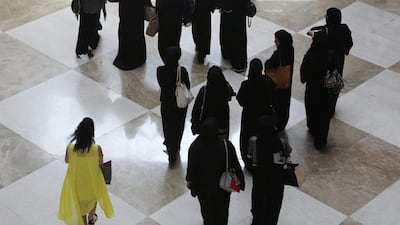It’s Ramadan and for the first time in my life I’ve felt the cold doors of the iron cage of capitalism enclose around me.
In school I read Max Weber’s Spirit of Capitalism and the Iron Cage, but couldn’t really conceptualise it.
Capitalism, he writes, “was once imagined as a spiritual calling. The early Protestants, believed through working hard and gaining wealth, they would earn God’s favour. Later, God was put aside and the drive for wealth and status became the means to the end.”
According to the research group Dinar Standard, the global Muslim market is worth an estimated $6.7 trillion (Dh24tn). Sadly, I provide the means to make abaya merchants and other modest clothing producers rich.
The burqa, chador, abaya and hijab were once viewed by the West as scary symbols of Islam. Now with celebrities such as Rihanna, Kim Kardashian and others “going sharia” for a day, Muslim clothing has gone the way of blue jeans in the early 1980s, from simple, inexpensive work wear to a desirable designer item.
Marx called this phenomenon the enigma of commodities. This is when an item goes beyond its original purpose and takes on a mysterious new social character.
In other words, it becomes a status symbol.
For the past 15 years, the abaya has been tweaked and teased using everything from fur to denim.
Until recently, abayas could be found for a reasonable price especially if you went to the souq. Prices ranged from Dh40 to Dh90. Sadly, those days are gone. The same shops are now selling abayas for anything from Dh350 to Dh1,300. What’s happened?
Several things drive the fashion industry’s interest in the Muslim world. Firstly, some in the US are using fashion as one of the many means of “reforming Muslim identity”, according to former US State Department adviser Shahed Amanullah. One path to this “reform” occurred in 2011, when an exhibition called iCover opened in Sharjah. This show, which was accompanied by a book and documentary, was designed to document the stories of covered women in the US. Those who visited the exhibit saw the following message: “You don’t have to wear only black. You should wear something that you can run and jump in.”
Two years later, you have hijab-wearing bloggers documented on social media by photographer Langston Hues and his Modest Street Fashion talent search. And you have the Dubai Islamic Economy Development Centre, which opened in 2013, and is one of many initiatives to focus on fashion and other industries. We also have the Islamic Fashion Design Council.
“What is the purpose of these efforts? Is it to build power within the Islamic communities or simply to make money?” Tariq Ramadan, the academic and writer, asked in a lecture recently. And where is the ordinary Muslim woman in all this? She is, in my opinion, a captive trying to escape the iron cage of fashion.
Leaving aside the abaya exploitation currently taking place at a souq near you, this speaks to a broader issue. Who is controlling how Muslim women dress? It seems the abaya is now a luxury item. This is especially seen with the rise of the hijabi fashion, which uses big-name brands and layers to cover up modestly.
Striving to look good is permitted in Islam, but there is a limit. Many will say that fashion drives fickle trends, conspicuous consumption and a tendency to show off to please others.
American activist Linda Sarsour illustrates this in I’m Tired, one of her Hijabi Monologues: “I’m tired of picking out outfits, colours, accessories, every day for public relations purposes-to ensure I look approachable, yet modest. It is so much easier to throw on my linen shawl and black abaya over my pyjamas.”
This is the way of life I prefer – a simple abaya without the bling and the iron cage.
Maryam Ismail is a sociologist and teacher who divides her time between the US and the UAE

